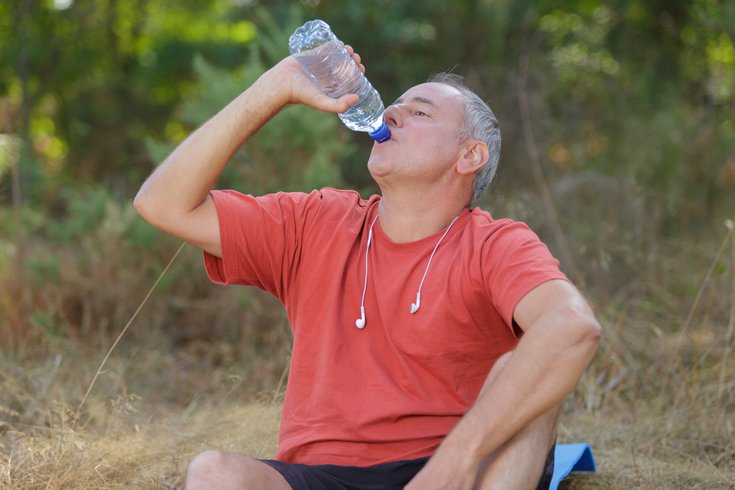
May 20, 2021
 Source/Image licensed from Ingram Image
Source/Image licensed from Ingram Image
The Institute of Medicine recommends men receive 125 ounces of water from direct intake or food each day. For women, the recommendation is 91 ounces.
Drinking enough water every day is good for your overall health. So says the U.S. Centers for Disease Control and Prevention and a wide range of experts.
Hydration is one of the most basic, simple and inexpensive parts of a healthy lifestyle. And while water is the predominate and perhaps most effective source of the fluids your body needs, there are others as well.
If you have ever tried to elevate your water consumption, you know it take a conscious effort to make it a habit, even with bottled water seemingly everywhere at our finger tips. Nevertheless, hydration offers a great return on investment for what many would consider a lighter lift on the spectrum of healthy behaviors.
According to Harvard University’s T.H. Chan School of Public Health, drinking enough water each day is crucial for many reasons including the regulation of body temperature, keeping joints lubricated, preventing infections, delivering nutrients to cells and keeping organs functioning properly. The school also lists improved sleep quality, cognition and mood as other benefits.
Experts also site studies that suggest long-term benefits of drinking water, depending on a wide variety of factors. These benefits might include lowering the risk of colorectal cancer and cancers of the urinary system, heart disease, urinary tract infections, kidney stones, constipation, high blood pressure and stroke. Drinking water also may help with weight loss.
Dehydration is front and center in any discussion of water. According to the Mayo Clinic, lack of water can lead to dehydration — a condition that occurs when you don't have enough water in your body to carry out normal functions. Even mild dehydration can drain your energy and make you feel tired.
The CDC defines daily fluid intake (total water) as the amount of water consumed from food, plain drinking water and other beverages. The CDC notes that daily fluid intake recommendations vary by age, sex, pregnancy and breastfeeding status, and that there is no average requirement for how much plain water adults and youth should drink daily.
That said, the CDC, along with many other scientific organizations, reference a National Academy of Medicine recommendation for total water intake from all food and liquids at 125 ounces (about 15 cups) for men and 91 ounces (about 11 cups) for women. The CDC reports that plain water contributes 30% of total water intake in men, with 70% coming from other dietary foods and liquids. Plain water intake in women is 34%.
Another report from Harvard says that your body would be perfectly content if you drank nothing but water. But it also suggests that while at least half of your daily fluid should come from water, about one-third can come from unsweetened coffee or tea. Ideally zero water comes from drinks sweetened with sugar or high-fructose corn syrup.
When it comes to meeting our daily needs for water consumption, women hit the mark and men are very close.
Data from the National Health and Nutrition Examination Survey found that among U.S. adults, women consumed 93 ounces of water per day — just ahead of the National Academy of Medicine's 91-ounce recommendation, and men consumed an average of 117 ounces — just below the recommended 125.
Additionally, the survey found that men ages 60 and over were the worst at meeting the recommendations, consuming less water than men ages 20 to 59. The same held for women ages 60 and over, who consumed less water than women ages 20 to 59.
There are any number of ways to build hydration into your lifestyle and develop routines. The University of Pittsburgh Medical Center offers tips that include having a glass of water first thing in the morning, another one an hour before you go to bed, and a healthy-sized drink with every meal. UPMC also cites pineapples, watermelon and blueberries as fruits high in water content.
For my 50-plus men (and women) readers, the National Institute on Aging reminds us that with age you might lose some of your sense of thirst. To get enough fluids without adding calories, they suggest that you don’t wait until you feel thirsty to drink water, have a full glass of water before you exercise and drink a full glass of water when you take a pill.
The American Heart Association offers a couple of practical tips: When you are well hydrated, your heart doesn’t have to work as hard. Plus, sports drinks with electrolytes may be useful for people doing high-intensity, vigorous exercise in very hot weather, but they tend to be high in added sugars and calories. The same goes for fruit juices and soda. All of which leads them to conclude that water is best.
As far back as 2002 Heinz Valtin, of Dartmouth Medical School, writing in the Journal of Physiology, took exception to the idea that we should all drink at least eight 8-ounce glasses of water a day. He was joined by a number of prominent people who found no scientific evidence supporting the notion.
There are several theories as to the origin of the so-called 8x8 rule, but the actual source is unknown. However, Heinz credits the emersion of this theory as one of the factors that may have launched our national preoccupation with water.
Almost 20 years ago, Heinz took note of the cultural emergence of water-bottle and container-carrying Americans, and the acceptance of individuals to sip water anywhere. Today, water on your person or in close proximity has become a societal norm, as has the emergence of numerous bottled water manufacturers, flavored water products and sports drinks. Together with tap water, these products provide an enormous opportunity to meet one of our most fundamental health needs.
Regardless of how you meet your daily fluid target, and whether you’re sipping to be cool or healthy, it’s important to be conscious of the benefits and work to build hydration into your daily routines. Drink up!
Louis Bezich, senior vice president of strategic alliances at Cooper University Health Care, is author of "Crack The Code: 10 Proven Secrets that Motivate Healthy Behavior and Inspire Fulfillment in Men Over 50." Read more from Louis on his website.